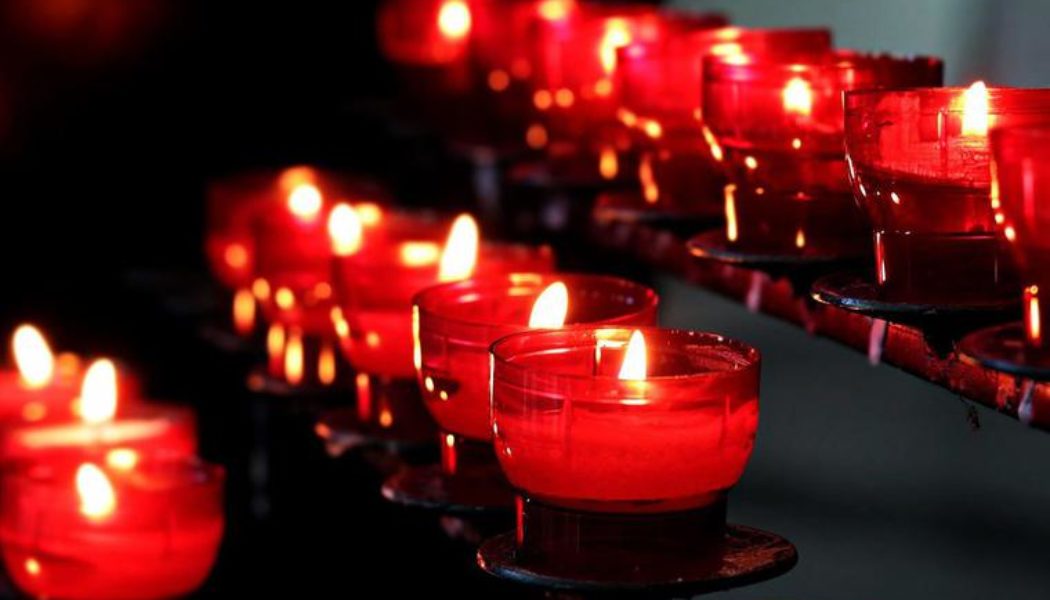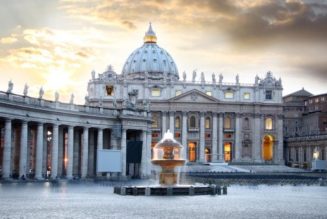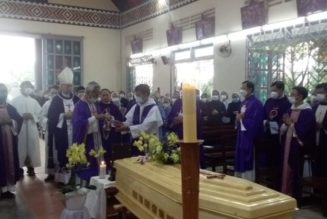
We gather here to mourn the loss of John [not a real person], and provide support for his friends and family, particularly his mom and dad, brothers and sisters, and high school classmates.
We commend John’s soul to God’s mercy and offer this funeral Mass precisely for that reason.
Thus, while you may hurt more deeply than ever before, and understandably so, I ask you to join me — in prayer — in interceding for John and also each other. Because in Our Lord Jesus Christ, death doesn’t have the last word. He does. Continue offering Masses and other prayers for John, and yourselves, in the coming weeks, months, and, yes, years ahead. Though John is no longer with us here on earth, we can still have hope that he is not beyond the reach of our prayers, and no prayer is wasted in the kingdom of God.
We might be tempted to turn inward, wondering what we could’ve said or done differently, to prevent this great tragedy — and thus mire ourselves in guilt, or even despair.
Don’t go there. And if you find yourselves in that place, please don’t stay there.
Instead, every time you’re tempted to blame yourself, I exhort you to offer a prayer for John’s
soul, and the consolation of you and others. You might not experience immediate relief, but you’ll be refocusing on the good: what you can do, not what you wish you could’ve done — something over which you have no control.
And I think John, if he could speak to us today, would tell us three things: First, “Thank you for your prayers.” Second, “Don’t blame yourselves for my death.” Third, “Talk to each other about your struggles, and be on the lookout for others who are suffering, so that future tragedies like mine can be averted.” Because John sees clearly now that, while his desire to end his suffering was understandable, the method he chose has increased suffering for those whom he loves.
In having a funeral Mass for John, some might charge the Church with hypocrisy, based on her past practice and teachings. After all, didn’t the Church for many years preclude funeral Masses for those who died by suicide, and prevent them from being buried in Catholic cemeteries? And thereby pronounce judgment that such persons could never attain heave
Yes, regarding funeral Masses.
Yes, regarding burial in Catholic cemeteries.
And a big “No” on pronouncing eternal judgment on those who have taken their lives.
While some might criticized the Church’s past pastoral practices, their purpose was to emphasize suicide’s gravity, a reminder that those who commit suicide as a mortal sin cannot attain heaven.
But the Church certainly didn’t — and doesn’t — presume that those who die by suicide have committed mortal sins; and thus, again, our prayers for John and others, knowing that only our merciful Lord can judge perfectly (CCC 2283).
We also should remember that a mortal sin has three components: (1) grave matter; (2) full knowledge and (3) complete consent. As the Catechism of the Catholic Church (CCC) teaches, mortal sin “presupposes knowledge of the sinful character of the act, of its opposition to God’s law. It also implies a consent sufficiently deliberate to be a personal choice” (CCC 1859).
We know that John struggled with depression, though he seemed to be doing better. Therefore, the unexpected nature of his death, while undoubtedly tragic and painful — can give us hope in the Lord for his spiritual well-being, and thus a further reminder to pray.
In recent decades, we have learned even more that mental illness, for example, can mitigate one’s culpability regarding suicide, that one’s complete consent might be lacking in an agonizing choice made precipitously, such as in John’s case (CCC 2282–2283). Depression can shackle the will and darken the outlook of even the most ardent Type A personality. As one therapist has remarked, depression lies. It lies about our self-worth, God’s love for us and our ability to overcome our trials.
Sadly, there is a growing trend to “redeem” suicide, to help loved ones embrace “death with dignity” when they determine life has become intolerable for one reason or another. However, a planned suicide is more likely to increaseculpability for all concerned, not reduce it. “We are stewards, not owners, of the life God has entrusted to us” (CCC 2280). Still, in these cases too, we commend those who’ve died to God’s mercy. And you need not be Catholic to benefit from prayers, including memorial Masses.
In reality, “being in control” of our lives is not paramount, and a most unwelcome trial can — in time — be an occasion of great spiritual growth, including through allowing others to aid us in our anguish. Jesus can and will transform our suffering, if only we avail ourselves of him and his Church, which may encompass the God-given gifts of psychotherapy and medication, when desired immediate relief is not forthcoming (see Sirach 38:1–15).
Let us pray for our brother John and console each other in Christ. When we wonder whether suffering can be redemptive, we need only glance anew at a crucifix, a sign that Jesus, at his weakest, became his most triumphant over sin, death and the devil (cf. Ephesians 6:12). At every Mass, we offer anew and celebrate Christ’s one Sacrifice. Jesus died for each of us, including John, so that we might reign with him forever in heaven (1 Timothy 2:4).
And so when we struggle here on earth, let us remind ourselves that we are made in God’s image and likeness, that we are children of God through baptism, and that, as St. Paul counsels, God’s power can — and will — reach perfection in our weakness (2 Corinthians 12:8–10).
May the divine assistance remain always with us. And may the souls of the faithful departed, through the mercy of God, rest in peace.
Join Our Telegram Group : Salvation & Prosperity








